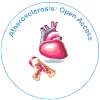开放获取期刊获得更多读者和引用
700 种期刊 和 15,000,000 名读者 每份期刊 获得 25,000 多名读者
抽象的
Peroxisome Proliferator-Activated Receptor Activators Target Human Endothelial Cells to Inhibit Leukocyte-Endothelial Cell Interaction
Simon Jackson, Farhad Parhami, Xiao-Ping Xi, Judith Berliner, Willa Hsueh, Ronald Law, Linda Demer
An early event in acute and chronic inflammation and associated diseases such as atherosclerosis and rheumatoid arthritis is the induced expression of specific adhesion molecules on the surface of endothelial cells (ECs), which subsequently bind leukocytes. Peroxisome proliferator-activated receptors (PPARs), members of the nuclear receptor superfamily of transcription factors, are activated by fatty acid metabolites, peroxisome proliferators, and thiazolidinediones and are now recognized as important mediators in the inflammatory response. Whether PPAR activators influence the inflammatory responses of ECs is unknown. We show that the PPAR activators 15-deoxy- Δ12,14-prostaglandin J2 (15d-PGJ2), Wyeth 14643, ciglitazone, and troglitazone, but not BRL 49653, partially inhibit the induced expression of vascular cell adhesion molecule-1 (VCAM-1), as measured by ELISA, and monocyte binding to human aortic endothelial cells (HAECs) activated by phorbol 12-myristate 13-acetate (PMA) or lipopolysaccharide. The “natural” PPAR activator 15d-PGJ2 had the greatest potency and was the only tested molecule capable of partially inhibiting the induced expression of E-selectin and neutrophil-like HL60 cell binding to PMA-activated HAECs. Intracellular adhesion molecule-1 induction by PMA was unaffected by any of the molecules tested. Both PPAR-α and PPAR-γ mRNAs were detected in HAECs by using reverse transcription-polymerase chain reaction and a ribonuclease protection assay; however, we have yet to determine which, if any, of the PPARs are mediating this process. These results suggest that certain PPAR activators may help limit chronic inflammation mediated by VCAM-1 and monocytes without affecting acute inflammation mediated by E-selectin and neutrophil binding.

 English
English  Spanish
Spanish  Russian
Russian  German
German  French
French  Japanese
Japanese  Portuguese
Portuguese  Hindi
Hindi